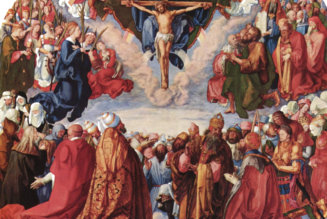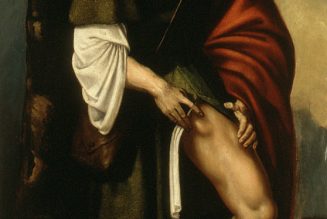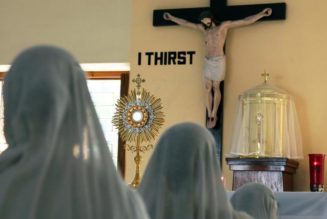Marcus Freeman has yet to start his first season as head coach of the University of Notre Dame’s football team — that’ll come on Sept. 3, when he leads the No. 5-ranked Fighting Irish against the team he played for during his own collegiate career, the No. 2 Ohio State Buckeyes.
But even though the season has yet to kick off, the first-year head coach is already racking up the wins.
For one, Coach Freeman has helped the Irish secure the No. 3 recruiting class heading into 2023, according to Rivals.com. It’s an astounding accomplishment, considering Notre Dame’s reputation as a difficult program to recruit elite talent to, given the high academic and personal-conduct standards required of student-athletes at the nation’s premier Catholic university. In fact, Freeman’s predecessor, Brian Kelly, has cited Notre Dame’s recruiting restrictions as part of the reason he abruptly left for LSU.
But as Freeman told the Register, he believes Notre Dame’s combination of quality football with top-notch academics makes it the complete package.
“I believe I have a monopoly on college football,” said Coach Freeman, who added that the university’s Catholic character is an “added bonus” for recruits coming from faith backgrounds.
Freeman’s success is also likely attributed to his relatability to the young men he recruits and coaches. As a former college and professional player, and still only 36 years old, he has earned the reputation as a “player’s coach.” He tells the Register the key is to set clear expectations with his players, but also to be himself around them.
“You’ve got to challenge them, and you’ve got to push them. But I don’t need them walking on eggshells. I don’t need them to fear me.”
Freeman’s recruiting success certainly has Irish eyes smiling, but so have some of his moves more related to the Xs and Os of life. For one, he has restored the long-standing, game-day tradition of players going to Mass at the Basilica of the Sacred Heart, exiting out the famed “God, Country, Notre Dame” door, before walking across campus to Notre Dame Stadium. Kelly had halted the practice early in his tenure and had instead moved the team Mass to the night before the game.
Freeman told the Register that he was motivated to bring back game-day Mass after reflecting on his own playing days and recalling how receptive a young man is in the hours leading up to a big game.
“So, to me, what better time is there to go have Mass? What better time to be able to really be on the edge of your seat to get every word that comes out of the priest’s mouth and to be as close to God as you can?”
A Christian, Freeman spent Sundays in his youth alternating between the church communities of his dad, an African American, and his mom, who is Korean. He told the Register that he’s grateful for the Christian context at Notre Dame, which provides an opportunity for the young men he coaches to ask big questions about life and faith.
“That’s important for me. I want our guys to wonder about what it means to embrace Jesus Christ.”
While Freeman isn’t Catholic, his wife, Joanna, is. And so are their six kids: Vinny, Siena, Gino, Nico, Capri and Rocco. The Fighting Irish figurehead has previously shared photos from his youngest child’s baptism on Twitter.
In another move popular among Catholics, Coach Freeman has his wife and kids come to practices and team facilities and encourages his coaches to invite their families as well. He told the Register that part of the reason is so that he can maximize the time he can spend with his family amidst his busy schedule. But there’s also an important lesson he’s hoping to impart to his players, some of whom he has previously said may not have a positive male role model in their life.
“I want them to see us as fathers and as husbands, because those lessons that they learn from watching us will last forever.”
Read Freeman’s full conversation with the Register below.
There’s a saying that, for American Catholics, the Notre Dame football coach is the most important leader after the pope. What do you make of stepping into this role, leading this squad that has so much tradition behind it and represents not just a student body or a state, but the whole Catholic community in the U.S.?
It’s a great reminder of the privilege and the opportunity you have to lead this football program. And we all need reminders. It’s the same thing when you talk about being the first Asian American or [second] African American coach [at Notre Dame]. They’re great reminders.
For me, my daily inspiration, why I come to work every day, is the players. It’s to help these young people reach their goals, and that’s their current goals [and] that’s their future goals that they don’t even know about. But that’s why I come to work every day: to help them reach their goals.
I hope a result of every day pushing these guys to reach their goal is to open doors for the next Asian American or African American coach, being a great representation for the Catholic community, all these different things that come along with being a head coach at Notre Dame.
But I think, if you approach each day like … you have all these different responsibilities and different expectations from people, that it can become overwhelming. My focus is very seamless: the players. Serving our players, helping them reach their goals. And a result of that, hopefully, is they come here to be a national champion. That’s one of their goals, and that’s my job: to do everything in my power to help them do that; to become NFL draft picks, become successful husbands, successful fathers. And so that’s my daily approach, for sure.
You mention helping your guys become successful husbands and fathers. One of the things that you’ve implemented that a lot of the Notre Dame community loves is bringing your wife and kids to practice and encouraging your other coaches to do so with their families. What’s the idea behind that? And how does that fit into your broader philosophy of what you’re doing as a coach?
The time demands on being a coach are extremely high. And if I could spend five to 10 minutes with my kids at practice or post-practice or in the office, I want to be able to do that. I want to be able to blend my family with the football family that I have here.
But the other part of that is making sure that our players see us outside of just being coaches. I want them to see us as fathers and as husbands, because those lessons that they learn from watching us will last forever. They’ll last an eternity, in terms of [helping them] view what being a father and a husband is like.
And so I think it was important not just for me to say that, but for me to do it, to promote it, and for other coaches to understand that’s okay. I’ve been around coaches, head coaches, that say one thing but they really don’t mean it. I want to be the coach that says, “No, I said, ‘Bring your families around.’ Then bring your families around. I want your families to feel like they can come to any practice, come to the office, and be a part of what we’re doing.”
Do you think it’s easier to do something like that at a place like Notre Dame, where faith and family are hopefully part of the identity?
I would hope it’s promoted, but I think it just comes down to the leader. It comes down to who you are as a leader and what type of culture and atmosphere you’re really trying to promote.
Speaking of your family, you’re a Christian, but not Catholic; but your wife, Joanna, is Catholic, and your kids are baptized Catholic and being raised Catholic. You’re sort of surrounded by Catholics at home. So when you first came to Notre Dame as defensive coordinator and then as you step into being head coach, is that kind of familiarity with Catholicism helpful? I mean, your boss at Notre Dame is a priest — Father John Jenkins.
Yeah, I think it was something I really didn’t know much about before I got here. And I think you have this perception of what the Catholic faith is: They have this thing called “Mass,” and you have all these different routines that you go to and you participate in.
But Catholics are Christians, and that’s the best thing about it. You go to Mass, and our entire team goes to Mass, Catholic or not Catholic. And you realize that we are all embracing and believing in Jesus Christ as our Savior. That’s important for me. I want our guys to wonder about what it means to embrace Jesus Christ.

And I think that’s part of our religion, that there’s never a full understanding; I think our God wants it that way. And so we continue to find ways to learn more and dive deeper into our Christian faith.
Speaking of Mass, you’re restoring the game-day tradition of Mass at the basilica and then walking over to the stadium. Interestingly, Robby Toma, a former player, commented on Twitter that “it’s pretty hard to flip the game switch on after an hour Mass” — that was his thought. So why was restoring that important to you?
Well, it was something that I remember as a recruit, seeing the players walk out of the basilica from Mass to the stadium. And I thought it was something that was always done until I got here last year, and I realized it wasn’t.
When I became head coach, it was something I wanted to go back to. And my reason is because I think back to being a player; you’re so vulnerable those three, four hours before a game. When you have a team meeting and your coach gives you a pre-game speech hours before the game, you’re on the edge of your seat, just hanging on to every word that he says.
So, to me, what better time is there to go have Mass? What better time to be able to really be on the edge of your seat to get every word that comes out of the priest’s mouth and to be as close to God as you can?
And if you’re any type of competitor, when the foot hits the ball, you’re going to be ready to roll. I don’t want [my players] to be ready three hours before the game; I want them to be ready at game time. And that’s going to be part of the message: Let’s be calm today before the storm. When the foot hits the ball, we’re surrounded by competitors. If you can’t flip the switch and you can’t get ready, then this probably isn’t the place or the game for you. And so whenever someone puts the ball down and says, “Let’s compete,” our guys are going to compete. That’s a big reason why I decided to do that.
I remember, in high-school football days, everyone listened to Metallica before the games, and it wasn’t really my thing. So maybe you’ll start a trend where people listen to Gregorian chant before their Friday night football games instead.
[laughter] Yeah!
Going back to your family: In the Catholic world, having six kids isn’t necessarily atypical, but in the broader world, it definitely is. What’s your greatest joy about having a big family? And how do you think it helps you lead a big football team?
Sometimes you take it for granted. It’s when you look back at those pictures, just scrolling on my iPad: Those memories come up of your kids, and you realize how fast time goes. And you have to remind yourself to try to have an impact on your kids as much as you can because they’re going to be gone before [you know it]. We have a ninth-grader now who was just a baby yesterday.
Hopefully my greatest impact on my kids is that they know that their dad sacrificed and did everything he could to make sure they have a really successful future and that they could achieve anything they want to achieve. I don’t pick and choose to be away from my family just because I want to. It’s part of the sacrifice that I’ve decided I want to do to help my family at home have success and also to help these kids [on the team] that I’m involved with have success. So that’s important to me.
And how does it affect you being a leader of 120 kids? It’s the same thing again: What are you doing on a daily basis to make sure that you’re trying to help the people around you have success? That’s what it’s about. It’s about helping these people figure out ways to achieve goals that maybe they couldn’t even imagine. That’s as a father; that’s as a football coach; that’s as a leader of the football program — every day.
That’s a mindset you speak about with such conviction. I’m wondering, can you point to your time as a coach, either in your previous coaching positions or at Notre Dame, where there have been those kinds of moments where you helped someone achieve something they couldn’t even imagine when they showed up?
I’ve got plenty of them; I remember that’s what kind of changed my mindset in coaching. I got into coaching because I loved football, and I knew I wasn’t going to be able to keep playing football. And I said, “Okay, I want to stay around the game of football and be on the sidelines.” And then I remember a kid I was coaching at Ohio State as [a graduate assistant]: All of a sudden, you give them a tip sheet, and they go and they have a sack or make a big play, and it just gave you such a feeling of satisfaction because you helped that kid achieve his goal.
That’s when I learned that, okay, this thing is about helping others. This is about making sure other people reach their goals. This isn’t about me and me being on top of a pedestal saying, “I’m the best at what I do.” No. This is about helping others reach those goals.
And those texts you get from former players: “Thanks, coach; I appreciate you.” “Thanks for pushing me.” “Thanks for the lessons that you taught me.” That’s why you do it. It’s not “Thanks coach, you helped me win every game we played.” If that’s the result, great man, that’s awesome, and I’m happy for Notre Dame; I’m happy for our players. But again, then what? Okay, you win a national championship, then what? It’s on to the next one; or it’s about continuously helping your players and the people you’re involved with have as much success as you can.
You’ve been described as a player’s coach. And anyone who saw that spoof video that you and a couple players did for the “Shamrock Series Jerseys” unveil can see that. But how do you balance or integrate that relatability, that ability to connect to these young men, with also being an authority figure? What does that look like for you?
I think sometimes we, as coaches, get this worry that “I can’t be normal around my players.” Like I can’t be myself, because I have to be this authority figure, and I have to have them fear me. And that’s not what I believe in.
I believe I’m very clear with my expectations, right? If we have a team meeting or I’m saying something to the group, here’s the expectations [gestures decisively]. Here’s what and why I want you to do it. Here it was good; you met the standard, or maybe you didn’t meet the standard. You’ve got to challenge them, and you’ve got to push them. But I don’t need them walking on eggshells. I don’t need them to fear me.
I’m going to be very honest. If I don’t like something you’re doing, I’m going to say, “I don’t like what you’re doing. This is what I need you to do better.” If I like what you’re doing, I’m saying,
“Man, that’s a great job, and continue to do what you’re doing now.”
When we’re sitting eating in the cafeteria, having a meal, I don’t need to yell and scream at them or push them. I want to be able to talk to them as people, as individuals.

And so I think the ability to be relatable to your players is important, so they know, hey, Coach Freeman is just a normal guy. You’re dang right: I’m a normal guy, and my job is to lead. My job is to set standards. My job is to help you reach your goals. And so if you’re not able to [be] a normal person and able to sit with your players and get to know them and trust them and have that relationship with them and also lead them and push them in settings, then you might have to pick and choose.
For me, you know what? I just want to be who I am. I want to be Marcus Freeman as a person when I’m around my players. But at the same time, I also want to be very clear on the standards I have for them and push them to reach those standards, so they can achieve the goals they want.
Is there a connection with fatherhood? Not that your players are exactly like your kids, but it seems like you need to have that same kind of relationship with your own children.
I do. I think that’s the same thing. You can’t yell and scream at your kids 24 hours a day. They’ll just get numb to it. And, for me, the greatest display of love at times is discipline. You discipline your kids so you don’t see them repeat mistakes or you want to see them have more success.
Same thing with our players: I believe in discipline because I want the best for our players, but also I want them to be able to know that “I’m here for you. I love you; I care about you.” And that, to me, might sometimes be “shoulder to shoulder” time, or sometimes that might be just having a normal casual conversation. But the ability for them to feel like they can come into my office and talk to me, or that my kids can communicate with me about how they really feel, is important.
That personability has helped you have an incredible recruiting class in your first eight months as head coach. Notre Dame obviously has a reputation for being a difficult place to recruit, with its academic and discipline requirements. What do you make of that reputation? How have you been able to succeed? And, I’m also curious: How does the fact that Notre Dame is a Catholic-Christian university come up in recruiting, and is that an obstacle or maybe an asset?
I’ve never really had a situation where it has been an obstacle. For those [recruits] of the Catholic or Christian faith, it has been something that has been an added bonus for us.
I truly believe I have a monopoly on college football. And when I say that, I mean [I can offer] the ability to really play this game at the highest level, to compete against the best teams in the country, to be a team that made, before last year, two of the last three playoffs. I believe that you can come to Notre Dame and compete against the best teams in the country, and we’ll continue to get better.
But, two, [the university] has the same academic reputation as the Ivy League schools, your Northwesterns, your Dukes, your Stanfords, and some of those great academic institutions, too. The ability to combine them both, I don’t know if there’s another place in the country right now that can do that.
It’s only hard to recruit because you can’t recruit everyone. You can’t. You have to be strategic in terms of, hey, does this person fit Notre Dame? But the ability to say “Yes” or “No” early in the process can help you kind of focus on the guys that you believe will fit this place.
And so if you’re one of the best players in the country and you fit this place, then those are the guys we’re going to go after. We’re not just going to settle. And, obviously, the results are showing, and our coaches have done a really good job at recruiting.
Okay, one last question for you: Going into the season opener and really starting your first season as head coach, how can the Notre Dame and Catholic community, far and wide, pray for and support you?
Well, I think it’s just the ability to support our players. It’s extremely difficult to be a college student-athlete right now, in terms of the social media, in terms of mental health. They’re normal human beings, but the problem is that on social media there’s a lot of power given to different people’s opinions, in [the player’s] eyes. And I try to encourage them all the time to not be overly concerned with that. But I think it’s a lot easier said than done.
And so just to the fans; and to the people that read this article, support our players, the good and the bad. Blame the coaches, you know what I mean? We’re big guys, and we get paid really well to do this profession that we love. But those players, man, they give us everything they’ve got, so continue to support them.
Thanks so much for your time and your leadership and your witness. And “Go Irish!”
Awesome. Thank you, brother.
This interview was edited for style and clarity.
Join Our Telegram Group : Salvation & Prosperity
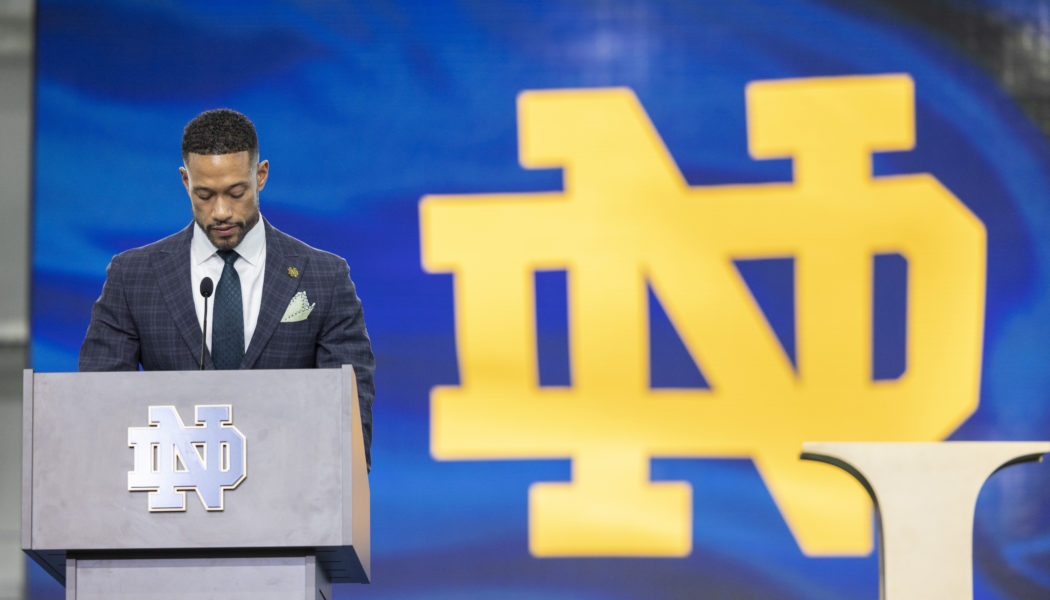


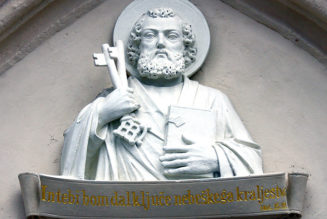
![TikTok is making sea shanties big again [note: skip the first video and jump down to the various ‘Wellerman’ mixes]…](https://salvationprosperity.net/wp-content/uploads/2021/01/tiktok-is-making-sea-shanties-big-again-note-skip-the-first-video-and-jump-down-to-the-various-wellerman-mixes-327x219.jpg)
